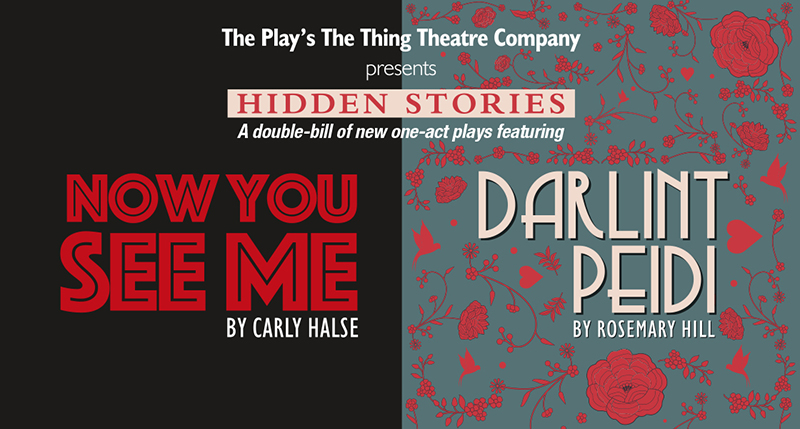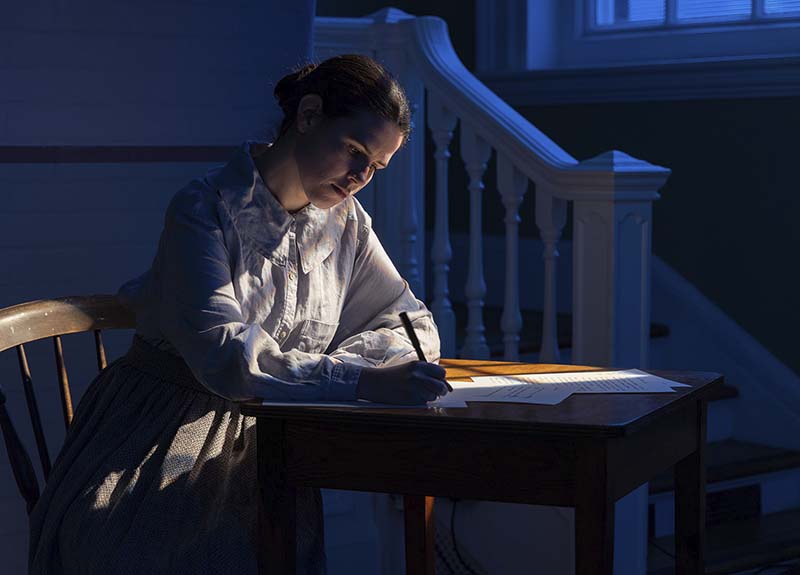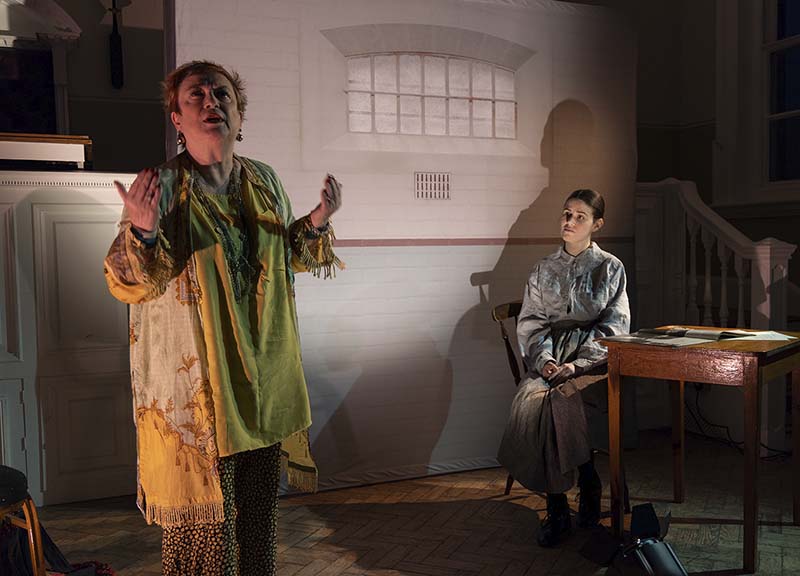The story behind Hidden Stories
23rd March 2023
Rosemary Hill and Carly Halse are currently on tour with their new plays, ‘Now You See Me’ and ‘Darlint Peidi’, which tell the hidden stories of Ruth Ellis and Edith Thompson - two young women hanged for murder.
There are many hidden stories behind these intriguing yet heart breaking cases that you might not be aware of. The information we know we probably got from the media. The problem with this is we are often fed a certain narrative by journalists which comes to be the one that everyone accepts. Quite often information is omitted or twisted in the media so no one really knows the full truth, apart from the individuals involved in the story.

Photo: Rebecca Hardcastle playing Edith Thompson.
You may think that Ruth Ellis’ life was full of fun, glitz and glamour and that she was a sexual predator, a night club hostess who neglected her duties as a mother. Yes she loved to dance and socialise, but she was a complex young woman who had been abused by her father at a young age.
Was Edith Thompson really a calculating, immoral seducer? Or was she a bright, intelligent, and articulate young woman unhappy in her marriage and having an affair with a younger man?
Has this got you thinking?
‘Now You See Me’ and ‘Darlint Peidi’ raise awareness of the hidden stories behind both cases that many of us don’t know about. The playwrights want to get audiences thinking about why and how this happened, the severe miscarriages of justice and ingrained misogyny in the justice system.
Why Darlint Peidi?
 Rosemary chose to write a play about Edith Thompson after reading a book called ‘A Pin to See the Peepshow’ by Fryn Tennyson Jesse, which is a fictionalised account of the life and murder trial of Edith Thompson.
Rosemary chose to write a play about Edith Thompson after reading a book called ‘A Pin to See the Peepshow’ by Fryn Tennyson Jesse, which is a fictionalised account of the life and murder trial of Edith Thompson.
The novel, written in 1934, follows the life of Julia Almond (nee Starling) as she pursues a successful career, but enters into a stifling and unhappy marriage. Totally bored and prone to flights of fancy Julia is quickly engaged in an affair with a much younger man which leads to a tragic outcome. Julia is a flawed heroine, but we feel deep sympathy for her.
The BBC later did a dramatization of the book with Francesca Annis as Julia and Bernard Hepton as her husband, Percy. John Duttine played her young lover. You can see a short clip here. It was an excellent production and both the book and the series prompted her to do more research on the case.
Rosemary was shocked by the miscarriage of justice that surrounded the case. Although Edith Thompson did write letters to her lover Freddie Bywaters wishing her husband was not around, she clearly didn’t understand that her words had consequences or that her jokes could be misconstrued. She certainly had no idea that her young lover was planning to confront her husband that fateful night as they came home from the theatre.
When she was arrested, Thompson was painted as a predatory older woman and vilified in the newspapers as having incited a young man to murder. She was hated by the public, thanks to the media. However, a petition was started to save Freddie – the person who actually committed the crime. Edith was innocent and had nothing to do with the murder, but her intense love letters to Freddie full of ambiguous language, would seal her fate. We know she was really executed for adultery. This tells us a great deal about the attitudes of the justice system to women in early 1920s.

Rosemary became interested in how the justice system and the media treats women. Are women judged more harshly than men? Have things changed at all? What happened over 100 years ago in the case of Edith Thompson is still very relevant to events happening right now. Miscarriages of justice occur far too frequently even today.
It begged the question – would Edith have had more sympathy had she lived in a more liberated era like the swinging sixties? Were the sixties just as bad? Were the changes at that time just surface changes? Rosemary has introduced a character to ‘Darlint Peidi’ that comes from the sixties and asks questions to see how the decades differed. It is a fascinating piece.
Why Now You See Me?
The case of Ruth Ellis also intrigued Rosemary. Ruth made headlines when she was executed in 1955 for shooting her lover, David Blakely, outside the Magdala pub in London.
Rosemary asked local actor and playwright, Carly Halse, to write a short play on her tragic life and the murder case. The play is a one woman play written by and starring Carly and entitled ‘Now You See Me’.
 Abused as a child, Ruth went on to form relationships which were never fulfilling or happy. She became a nightclub hostess in London. She worked and played hard and saw her only currency to be in her looks. It was at the nightclub where she met David Blakely. They had a violent and abusive relationship and a few days before she shot him, he had punched her so hard in the stomach that she miscarried.
Abused as a child, Ruth went on to form relationships which were never fulfilling or happy. She became a nightclub hostess in London. She worked and played hard and saw her only currency to be in her looks. It was at the nightclub where she met David Blakely. They had a violent and abusive relationship and a few days before she shot him, he had punched her so hard in the stomach that she miscarried.

She admitted to the shooting, but at no point did she say that Blakely was violent and caused her to miscarry. If this had happened today would this detail have been picked up and would we know that she was suffering psychologically from the years of mental and physical abuse? Would this have been taken seriously? Why did she not mention this important information?
What is also interesting about this this case is that her other lover, Desmond Cussen, procured the gun, taught her how to use it and drove her to the Magdala pub. A big question here is if he loved Ruth then why would he get her a gun and drive her to murder a man? Why would he let this happen? Cussen’s involvement that night was never mentioned in court. He was never questioned either. Why?
Ruth was seen by the media as a Femme Fatale, which couldn’t be further from the truth. She had the looks, but she was a fragile and intelligent woman. Prejudice played a huge role in her death.
There were several petitions at the time for the 28 year old to be spared the death penalty and to be given a life prison sentence instead. Rosemary’s father started one of the petitions. But sadly, things didn’t go her way, like many things in her life.
Following her death, Ruth’s case led to the defence of diminished responsibility, which means that the accused was suffering a particular state of mind and cannot be fully responsible for the crime. Which was a great step forward, but just two years too late. The death penalty was also abolished in 1965 - ten years after she was hanged.
‘The Ruth Ellis Files: A Very British Crime Story’ on BBC iPlayer uncovers evidence not shown at her trial. It also shows heart breaking tapes made by her son, Andy, about the effect his mother’s execution had on his whole life. He sadly took his own life when he was in his thirties. A truly tragic story.
Hidden Stories Tour dates
Two incredibly powerful plays written by women about women.
Darlint Peidi and Now You See Me are on tour and will be stopping at:
- Westacre Theatre, King’s Lynn – 21st April
- Bridge House Theatre, Warwick – 9th May
- Hanger Farm Arts Centre, Southampton – 12th May
- Applecare Arts – 15th – 17th May
- Brighton Fringe – 25th & 26th May
Thank you to Arts Council England for supporting us.
 We hope you will be able to join us on tour.
We hope you will be able to join us on tour.
Interesting sources:
Here are some very interesting websites, books and TV programmes that have helped us piece together and research these historic cases. We encourage you to take a look:
- Edith Thompson - Home - Edith Jessie Thompson
- ‘Rex V Thompson - A Tale Of Two Murders’ by Laura Thompson (no relation)
- ‘Au Revoir Now Darlint - The Letters of Edith Thompson’ edited by Laura Thompson
- ‘Criminal Justice’ by Rene Weiss